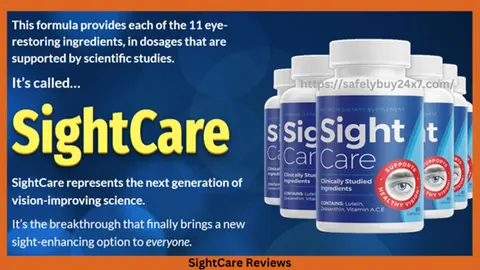Maintaining healthy vision is crucial for a high quality of life. As we age, SightCare review our eyes undergo natural changes, and various factors like lifestyle, environment, and genetics can impact our eye health. Sight Care, a comprehensive approach to preserving and enhancing vision, plays a pivotal role in ensuring that our eyes remain in top condition. In this article, we’ll explore the significance of Sight Care, common eye issues, and effective strategies for maintaining optimal eye health.
Understanding Sight Care
Sight Care encompasses a range of practices aimed at preventing eye diseases, detecting vision problems early, and managing eye health effectively. It includes regular eye examinations, proper nutrition, protective measures, and addressing any visual impairments.
Common Eye Issues
- Refractive Errors: These are the most common vision problems, including nearsightedness (myopia), farsightedness (hyperopia), astigmatism, and presbyopia. They occur when the shape of the eye prevents light from focusing directly on the retina, resulting in blurry vision.
- Age-Related Macular Degeneration (AMD): AMD is a leading cause of vision loss in older adults. It affects the macula, the part of the retina responsible for central vision, leading to a gradual loss of vision.
- Cataracts: Cataracts occur when the lens of the eye becomes cloudy, leading to blurred vision. They are commonly associated with aging but can also result from injury or certain medical conditions.
- Glaucoma: This group of eye diseases damages the optic nerve, often due to increased intraocular pressure. If left untreated, glaucoma can lead to irreversible vision loss.
- Diabetic Retinopathy: This condition affects individuals with diabetes and involves damage to the blood vessels in the retina, potentially leading to vision impairment or blindness.
Strategies for Effective Sight Care
- Regular Eye Exams: Routine eye exams are essential for detecting vision problems and eye diseases early. An eye care professional can assess your vision, check for any signs of eye conditions, and provide appropriate treatments or corrective measures.
- Healthy Diet: A balanced diet rich in vitamins and minerals supports eye health. Nutrients such as vitamin A, vitamin C, vitamin E, zinc, and omega-3 fatty acids are known to promote good vision and protect against age-related eye conditions.
- Protective Eyewear: Wearing sunglasses that block UV rays can help protect your eyes from harmful sun exposure. Additionally, safety glasses should be worn during activities that pose a risk of eye injury, such as certain sports or working with hazardous materials.
- Proper Screen Use: With the increasing use of digital devices, eye strain has become a common issue. Follow the 20-20-20 rule to reduce digital eye strain: every 20 minutes, take a 20-second break and look at something 20 feet away.
- Healthy Lifestyle: Regular physical activity, maintaining a healthy weight, and avoiding smoking contribute to overall eye health. Smoking is a major risk factor for several eye diseases, including AMD and cataracts.
- Managing Health Conditions: If you have chronic conditions such as diabetes or hypertension, managing these effectively is crucial for preventing eye-related complications. Regular check-ups and adherence to treatment plans can help protect your vision.
Conclusion
Sight Care is an integral part of maintaining overall health and well-being. By adopting proactive measures such as regular eye exams, a nutritious diet, protective eyewear, and healthy lifestyle choices, you can safeguard your vision and enjoy a brighter future. Remember, your eyes are invaluable—taking care of them today ensures that you continue to see the world clearly for years to come.
